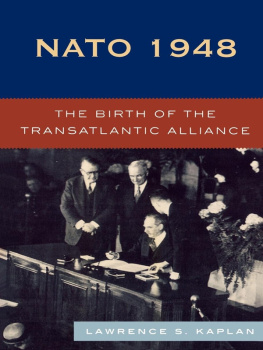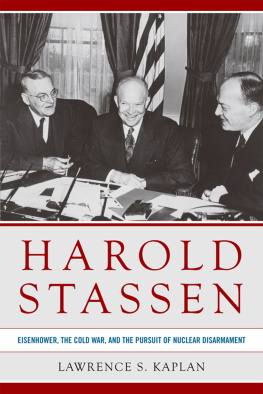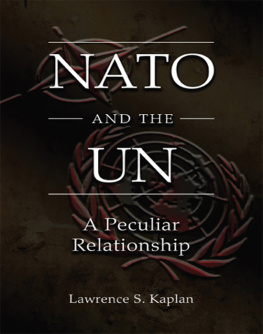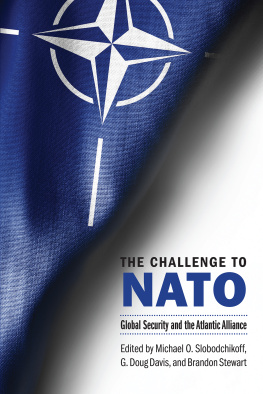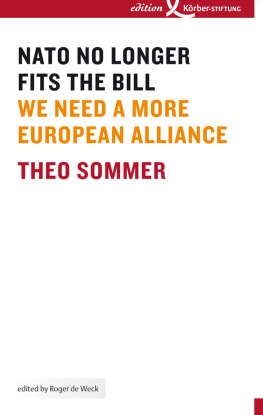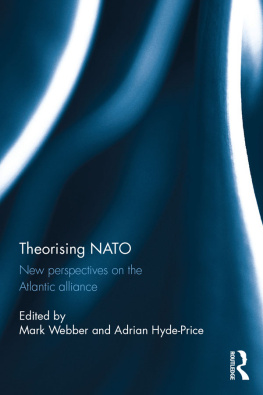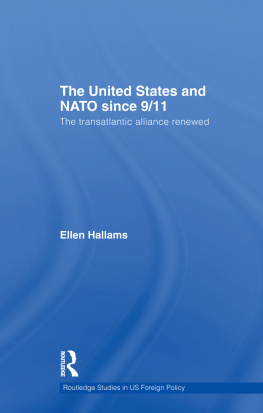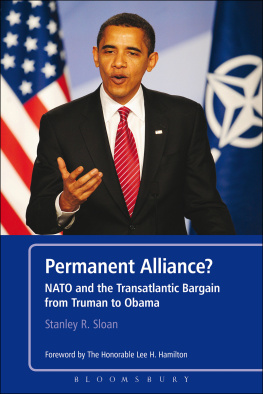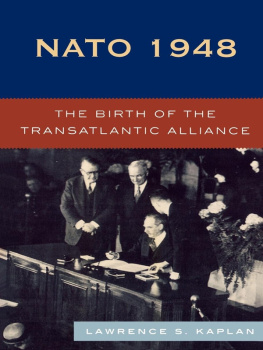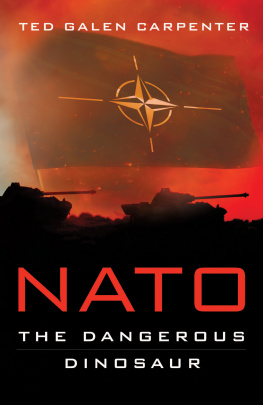Lawrence S. Kaplan - NATO 1948: The Birth of the Transatlantic Alliance
Here you can read online Lawrence S. Kaplan - NATO 1948: The Birth of the Transatlantic Alliance full text of the book (entire story) in english for free. Download pdf and epub, get meaning, cover and reviews about this ebook. year: 2013, publisher: Rowman & Littlefield Publishing Group, Inc., genre: Politics. Description of the work, (preface) as well as reviews are available. Best literature library LitArk.com created for fans of good reading and offers a wide selection of genres:
Romance novel
Science fiction
Adventure
Detective
Science
History
Home and family
Prose
Art
Politics
Computer
Non-fiction
Religion
Business
Children
Humor
Choose a favorite category and find really read worthwhile books. Enjoy immersion in the world of imagination, feel the emotions of the characters or learn something new for yourself, make an fascinating discovery.
- Book:NATO 1948: The Birth of the Transatlantic Alliance
- Author:
- Publisher:Rowman & Littlefield Publishing Group, Inc.
- Genre:
- Year:2013
- Rating:5 / 5
- Favourites:Add to favourites
- Your mark:
- 100
- 1
- 2
- 3
- 4
- 5
NATO 1948: The Birth of the Transatlantic Alliance: summary, description and annotation
We offer to read an annotation, description, summary or preface (depends on what the author of the book "NATO 1948: The Birth of the Transatlantic Alliance" wrote himself). If you haven't found the necessary information about the book — write in the comments, we will try to find it.
NATO 1948: The Birth of the Transatlantic Alliance — read online for free the complete book (whole text) full work
Below is the text of the book, divided by pages. System saving the place of the last page read, allows you to conveniently read the book "NATO 1948: The Birth of the Transatlantic Alliance" online for free, without having to search again every time where you left off. Put a bookmark, and you can go to the page where you finished reading at any time.
Font size:
Interval:
Bookmark:
Treaty of Economic, Social and Cultural Collaboration and Collective Self Defense between the Governments of the United Kingdom and Northern Ireland, Belgium, France, Luxembourg, and the Netherlands, signed at Brussels, March 17, 1948.
Convinced of the close community of their interests and of the necessity of uniting in order to promote the economic recovery of Europe, the High Contracting Parties will so organize and coordinate their economic activities as to produce the best possible results, by the elimination of conflict in their economic policies, the co-ordination of production and the development of commercial exchanges.
The co-operation provided for in the preceding paragraph, which will be effected through the Consultative Council referred to in Article VII as well as through other bodies, shall not involve any duplication of, or prejudice to, the work of other economic organizations in which the High Contracting Parties are or may be represented but shall on the contrary assist the work of those organizations.
The High Contracting Parties will make every effort in common, both by direct consultation and in specialized agencies, to promote the attainment of a higher standard of living by their peoples and to develop on corresponding lines the social and other related services of their countries.
The High Contracting Parties will consult with the object of achieving the earliest possible application of recommendations of immediate practical interest, relating to social matters, adopted with their approval in the specialized agencies.
They will endeavour to conclude as soon as possible conventions with each other in the sphere of social security.
The High Contracting Parties will make every effort in common to lead their peoples towards a better understanding of the principles which form the basis of their common civilization and to promote cultural exchanges by conventions between themselves or by other means.
If any of the High Contracting Parties should be the object of an armed attack in Europe, the other High Contracting Parties will, in accordance with the provisions of Article 51 of the Charter of the United Nations, afford the party so attacked all the military and other aid and assistance in their power.
All measures taken as a result of the preceding Article shall be immediately reported to the Security Council. They shall be terminated as soon as the Security Council has taken the measures necessary to maintain or restore international peace and security.
The present Treaty does not prejudice in any way the obligations of the High Contracting Parties under the provisions of the Charter of the United Nations. It shall not be interpreted as affecting in any way the authority and responsibility of the Security Council under the Charter to take at any time such action as it deems necessary in order to maintain or restore international peace and security.
The High Contracting Parties declare, each so far as he is concerned, that none of the international engagements now in force between him and any other of the High Contracting Parties or any third State is in conflict with the provisions of the present Treaty.
None of the High Contracting Parties will conclude any alliance or participate in any coalition directed against any other of the High Contracting Parties.
For the purpose of consulting together on all the questions dealt with in the present Treaty, the High Contracting Parties will create a Consultative Council, which shall be so organized as to be able to exercise its functions continuously. The Council shall meet at such times as it shall deem fit.
At the request of any of the High Contracting Parties, the Council shall be immediately convened in order to permit the High Contracting Parties to consult with regard to any situation which may constitute a threat to peace, in whatever area this threat should arise; with regard to the attitude to be adopted and the steps to be taken in case of a renewal by Germany of an aggressive policy; or with regard to any situation constituting a danger to economic stability.
In pursuance of their determination to settle disputes only by peaceful means, the High Contracting Parties will apply to disputes between themselves the following provisions:
The High Contracting Parties will, while the present Treaty remains in force, settle all disputes falling within the scope of Article 36, paragraph 2, of the Statute of the International Court of Justice by referring them to the Court, subject only, in the case of each of them, to any reservation already made by that Party when accepting this clause for compulsory jurisdiction to the extent that that Party may maintain the reservation.
In addition, the High Contracting Parties will submit to conciliation all disputes outside the scope of Article 36, paragraph 2, of the Statute of the International Court of Justice.
In the case of a mixed dispute involving both questions for which conciliation is appropriate and other questions for which judicial settlement is appropriate, any Party to the dispute shall have the right to insist that the judicial settlement of the legal questions shall precede conciliation.
The preceding provisions of this Article in no way affect the application of relevant provisions or agreements prescribing some other method of pacific settlement.
The High Contracting Parties may, by agreement, invite any other State to accede to the present Treaty on conditions to be agreed between them and the State so invited.
Any State so invited may become a Party to the Treaty by depositing an instrument of accession with the Belgian Government.
The Belgian Government will inform each of the High Contracting Parties of the deposit of each instrument of accession.
The present Treaty shall be ratified and the instruments of ratification shall be deposited as soon as possible with the Belgian Government.
It shall enter into force on the date of the deposit of the last instrument of ratification and shall thereafter remain in force for fifty years.
After the expiry of the period of fifty years, each of the High Contracting Parties shall have the right to cease to be a party thereto provided that he shall have previously given one years notice of denunciation to the Belgian Government.
The Belgian Government shall inform the Governments of the other High Contracting Parties of the deposit of each instrument of ratification and of each notice of denunciation.
In witness whereof, the above-mentioned Plenipotentiaries have signed the present Treaty and have affixed thereto their seals.
Done at Brussels, this seventeenth day of March 1948, in English and French, each text being equally authentic, in a single copy which shall remain deposited in the archives of the Belgian Government and of which certified copies shall be transmitted by that Government to each of the other signatories.
Whereas peace with justice and the defense of human rights and fundamental freedoms require international cooperation through more effective use of the United Nations: Therefore be it Resolved, That the Senate reaffirm the policy of the United States to achieve international peace and security through the United Nations so that armed force shall not be used except in the common interest, and that the President be advised of the sense of the Senate that this Government, by constitutional process, should particularly pursue the following objectives within the United Nations Charter:
Font size:
Interval:
Bookmark:
Similar books «NATO 1948: The Birth of the Transatlantic Alliance»
Look at similar books to NATO 1948: The Birth of the Transatlantic Alliance. We have selected literature similar in name and meaning in the hope of providing readers with more options to find new, interesting, not yet read works.
Discussion, reviews of the book NATO 1948: The Birth of the Transatlantic Alliance and just readers' own opinions. Leave your comments, write what you think about the work, its meaning or the main characters. Specify what exactly you liked and what you didn't like, and why you think so.

